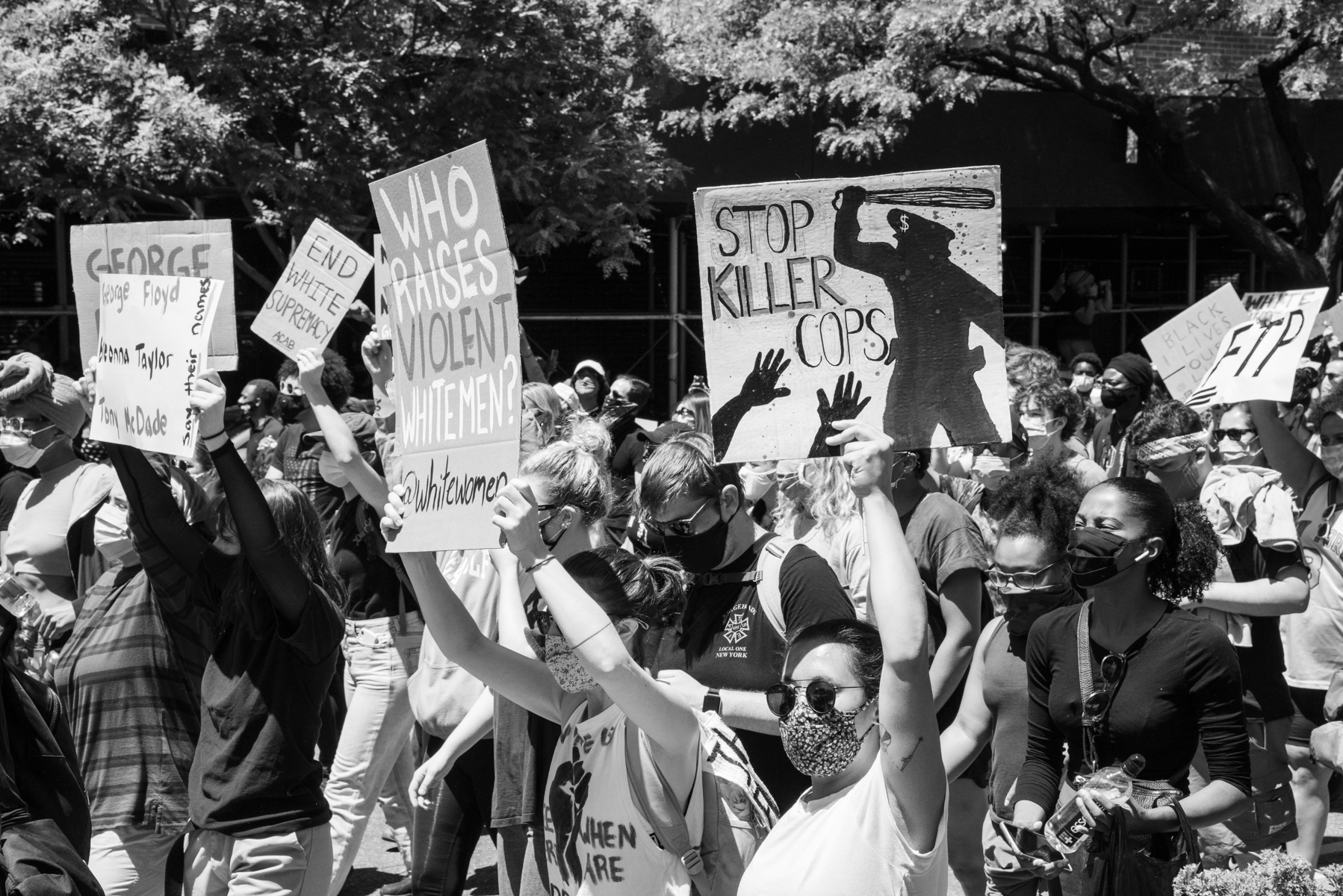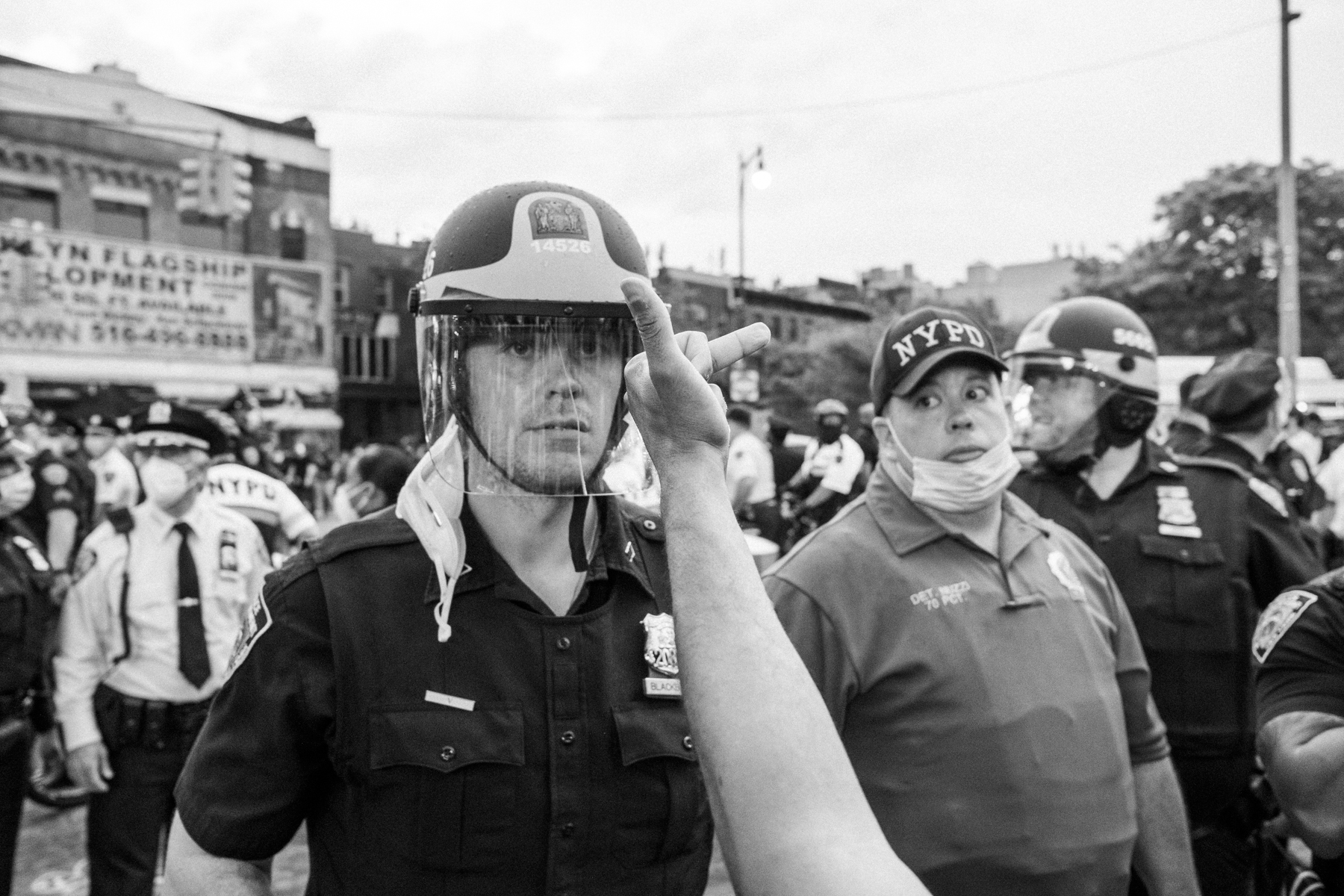In the wake of the deaths of George Floyd, Tony McDade, Breonna Taylor and countless Black people at the hands of the police, protests against racism and police brutality have spread across the country and the globe. At first, protesters demanded that all four of the Minneapolis police officers responsible for Floyd’s death be held accountable, but now, they are increasingly calling to defund the police — arguing that billions of dollars shouldn’t go to police departments in America when public education, housing programs and health departments are drastically underfunded. Some cities, such as Los Angeles and San Francisco, have already pledged to defund their police departments in the coming year, and in Minneapolis, officials have taken this movement one step further — by pledging to disband their police department all together and create a new community-based effort for public safety.
Though “defund the police” has become a rallying cry as of late in the aftermath of Floyd’s death and subsequent police brutality, efforts to defund and abolish policing in America are by no means new. Many Black radical activists such as Angela Davis and Malcolm X were vocal abolitionists, arguing for the end of both policing and the prison industrial complex in the US in the 60s.
In 2018, abolitionist organizers in Minneapolis were able to divest $1.1 million dollars away from their police budget and invest in a newly formed Office of Violence Prevention, a community led organization committed to public safety without policing. While this reform was an enormous accomplishment, this happened two years before Floyd was killed in the same city, which is why many advocates point to the need for further defunding and disbanding of police across the country.
“Defunding is necessary because instead of using that money for things like police trainings, we want to use that money to invest in things that have actually been shown to improve people’s lives — like healthcare, access to fresh foods and education systems that are reflective of the community’s needs,” K Agbebiyi, a social worker and abolitionist organizer based in New York City, tells i-D. “Police training, body cameras and other reforms fail to reckon with the fact that policing, as it was conceived and how it is used today, and how it will be used in the future is anti-Black. No amount of reform can fix something with rotten roots.”
Agbebiyi’s argument touches on the highly contested debate in America right now: should the police be defunded or reformed? Many politicians, including Washington, DC Mayor Muriel Bowser and New York Mayor Bill de Blasio, have ignored their citizen’s demands for a smaller police budget and have instead put forth a slew of police reforms such as bias training and mandatory body cameras intended to quell police violence against Black Americans. Campaign Zero, a police reform campaign started by activists associated with Black Lives Matter, recently unveiled its #8CantWait campaign which proposed several police reforms including a ban on chokeholds and firing shots at moving vehicles, and requiring comprehensive reporting of all crimes everywhere. Notably, employees at Campaign Zero recently admitted that the campaign was invalid, and many of the higher-ups at the organization resigned in admission that the reforms suggested were not well researched or executed.

Many have been extremely dissatisfied with reforms on the table across the country. Activists have taken to social media to call for immediate defunding and disbanding of police in place of reform, and many and have pointed out how past instances of reform have been ineffective — in 2014, Eric Garner was killed by a police officer in New York who held him in a chokehold, even though chokeholds were banned by the New York Police Department in 1993. Others have noted that neighborhoods with less police presence typically also have less crime, and have pointed out that crime in New York City fell significantly when the NYPD went on strike in 2015. In light of this, many believe that defunding the police and investing their budgets in other public goods is a more effective way of keeping communities safe.
“Time and time again we have seen police reform policies like mandatory body cameras and community oversight boards fail to keep our communities safe, even despite good intentions,” Jessica Shotwell, abolitionist organizer in Black Youth Project 100’s DC chapter and a PhD candidate at the University of Maryland, tells i-D. “Police reform assumes that policing can be ‘better’, so people advocate for more funding, resources and training for the police. What other job involves killing, harassing and terrorizing, yet gets rewarded through more funding? If we want the police to stop killing us, then we truly have no choice but to abolish the institution itself. A way to start is by defunding police departments and investing in community care, not cops.”
As an abolitionist, Shotwell aims to not only defund the police, but eventually abolish the policing system in America altogether. She is not alone in this effort. In response to the #8CantWait campaign, several abolitionist organizers created a new campaign entitled #8ToAbolition, which lists eight steps to disbanding and abolishing police forces across the country. The first is to defund the police, followed by demilitarizing communities and removing police from schools. The eventual goal of the campaign is to envision a radical new form of public safety where police no longer exist.
“Defunding the police will look like eliminating their budgets until the police as an institution is abolished,” Shotwell says. “We want to be very clear: defunding the police is an abolitionist demand, but it is not our only demand. We demand investment in safe housing, healthcare, access to food, public transportation and sustainable employment. We don’t just want to see the police department’s budget slashed to zero.”
Many argue that defunding the police is a crucial first step in changing the way that public safety operates in America. The NYPD, for example, has a $6 billion annual budget, but spends $2 billion on homeless services, $1.7 billion on sanitation and less than $1.3 billion on environmental protection annually. In the last few weeks, graphics have cropped up across the internet as a brutal illustration of how overfunded our police budgets are compared to spending on public goods: in Madison, WI, the annual police budget is $86 million dollars while only $19 million is spent on public health, and in Des Moines, Iowa, a third of the city’s budget is spent on police alone.

“In my opinion, I think that defunding the police would look like a divest/invest strategy, something my comrades in Free Them All 4 Public Health have really been discussing a lot recently, though the strategy has of course existed before then,” Agbebiyi says. “Cities and states would divest and take money away from the police budget, hopefully shrinking the pool of police officers, and diverting the money to other actually essential things like free housing, free healthcare and education budgets.”
While most can agree that defunding the police in some form is necessary, given extremely high budgets in most cities, there tends to be a disconnect among Americans about how exactly these budgets should be cut, or what defunding really means. Because the definition of abolition means abolishing the prison industrial complex and policing systems entirely, a lot of abolitionists have been upset by visions of “defunding” that mainstream media have put forth that don’t cut police budgets completely, or still allow a policing system to exist in some way. Some people are seemingly scared to go this route or view it as a little extreme; they’ve taken to social media to ask what would happen in emergencies where one might want to call the police, for example. However, abolitionist organizers hope to set up a new form of community safety. Visions of this differ, but many, such as the model put forth by Minneapolis abolitionist organizers at MPD150, advocate for civilian deescalation training, creating a separate dispatch for fire or medical emergencies, and other tactics that allow people to keep themselves and their loved ones safe in their community — without a police force present.
In cities that have yet to slash their police budgets, there have been pivotal developments — perhaps thanks to protesters increased demands and actions. New York recently repealed Civil Rights Law section 50-A, which has shielded police disciplinary records from the public for 44 years. Though not a direct defunding or disbanding of the office, this is an action that moves past reform and allows police to be held accountable for their actions by the public.
Though elected officials are the ones who ultimately have the power to determine a city’s budget, the demands of their constituents play a large role in what reforms or changes are made in a given location. For example, organizers in MPD150, Black Visions Collective and Reclaim The Block each played a huge role in Minneapolis’ decision to disband their police department. Black queer voices are normally at the forefront of these conversations too, both historically and in current discussions as well.
“Go to your city council members and mayor’s budget meetings,” Reina Sultan, a writer and abolitionist organizer, tells i-D. “Budgets are moral documents and you can voice your priorities at those meetings.”
As progress towards defunding and disbanding the police continues across the country, many look to abolitionist organizers to help imagine what a police free society could look like, and to lead the charge. You can get involved by signing petitions, writing letters to your local officials and by voting in local elections to ensure that people with your same priorities are in positions of power in your city.


